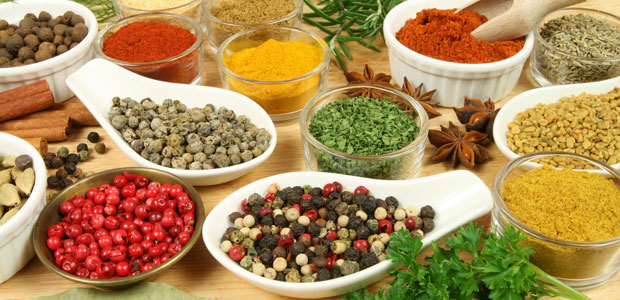Advertisement
June 10 is Herbs and Spices Day
Health Canada reports that the average Canadian consumes approximately 3,400 mg of sodium daily. For adults aged 19 to 50 that’s more than double the recommended adequate intake level, which is 1,500 mg. Statistics show that about 75 percent of the sodium we consume comes from processed food, so the logical step in reducing our … Continued

Health Canada reports that the average Canadian consumes approximately 3,400 mg of sodium daily. For adults aged 19 to 50 that’s more than double the recommended adequate intake level, which is 1,500 mg.
Statistics show that about 75 percent of the sodium we consume comes from processed food, so the logical step in reducing our sodium levels is to reduce our intake of processed foods. In addition, we can further reduce our sodium intake by seasoning our home cooking with flavourful herbs and spices in lieu of salt. This Sunday, June 10, celebrate Herbs and Spices Day by experimenting with different warm, earthy, and fragrant herbs and spices to season your food.
Herbs and spices from around the world
Cooking Indian? Mexican? Italian? No problem! The following herb and spice combinations will take you around the world—and you don’t even have to leave the kitchen. As an added bonus, many herbs and spices offer a myriad of health benefits.
Italian
When cooking pasta, pizza, and other Italian favourites include oregano, basil, flat-leaf parsley, and fennel. Oregano in particular is incredibly beneficial to our health, providing anti-inflammatory effects that may help those with Crohn’s, arteriosclerosis, and osteoporosis. Parsley, too, may play a part in promoting heart health; preventing arthritis; and fighting breast, skin, and prostate cancer.
French
French cuisine is notoriously rich and well-seasoned with herbs such as thyme, tarragon, and sage. Thyme is well-known for its ability to help with respiratory problems, by soothing coughs, bronchitis, and chest congestion. It’s also a good source of omega-3 fatty acids, which are essential to optimal brain, kidney, and heart function.
Asian
When experimenting with Asian cuisine pick up Thai basil, lemongrass, ginger, and star anise. Ginger, of course, has been credited time and time again for its ability to soothe an upset stomach; however, did you know that ginger is also a possible remedy for pain associated with arthritis?
Indian
Indian food is aromatic and colourful thanks to the wonderful spices it boasts, including coriander, turmeric, and cardamom. Turmeric has gotten a lot of attention lately, as its active compound, curcumin, is proving to be a nutritional superhero. Curcumin may be helpful in preventing cancer, treating digestive issues, protecting against pancreatitis, and relieving arthritis pain.
Mexican
Hot Mexican cuisine uses cumin, cayenne, paprika, and chipotle to achieve its layers of tongue-burning spice. Cayenne pepper contains a high concentration of the health-promoting compound capsaicin, which is often used to treat muscle and arthritis pain, as it appears to inhibit the body from sending pain messages to the brain when applied topically. Further, researchers have also found this heat-producing chemical may be a useful weight loss aid.
What are your favourite herbs and spices?





